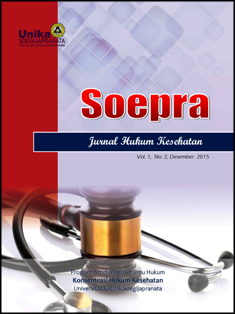The Role of Health Center’s Midwives in School Health Programs for Awareness of Breast Self-Examination of High School Students at Semarang District
Abstraksi
Midwifery service is a service that is inseparable from health care system. Breast cancer does not only attack to old ages but also to adolescence. A midwife is one of the health workers having an important and strategic position as an educator that is to provide health education on breast self-examination (Sadari). The objective of this study was to determine the midwife's role in arising awareness of breast self-examination (Sadari) to high school-aged students.
This was a socio-legal study having an analytical descriptive specification. It used first data and secondary data; the primary primary data gathering technique was through interviews to respondents and resource persons. The respondents consisted of midwives and female students at Semarang Regency while the resource persons were Heads of Semarang's Health Centers.
The results showed that the role of midwives in school health programs could be seen in screening and PKPR programs based on the Act Nr. 36 of 2009 on Health, especially Article 79 paragraph (1) and Health Minester's Regulation (Permenkes) Nr. 75 of 2014 on Health Center (Puskesmas), especially Article 36 paragraph (1). The aim of the screening and PKPR programs was to optimally improve the students' health in order to support the learning process. The midwife's role as an implementer and educator in implementing school health programs had been carried out through both programs. The midwife's role as an educator was to provide education and counseling to the students related to adolescent health. The midwife's role in school programs related to awareness of breast self examination had not been implemented optimally because the counseling focused more on adolescent reproductive health. The supporting factors were the availability of health facilities at the Health Centers such as counseling room and the cooperation between the Health Centers and the schools in relation with the implementation of the school health program through the coordination of the teachers handling UKS (School Health Unit) and with technical guidance and the supervising personnels of the Health Centers. The inhibiting factors, on the other hand, were lack of health resources availability such as health workers, funds, and health care facilities.
Soepra: Jurnal Hukum Kesehatan
Issue No.1 vol.5, Agustus 2019- Diterbitkan oleh Soegijapranata Catholic University

p-ISSN
e-ISSN 2548-818X
2024 Hak Cipta Milik Hukumonline.com




































